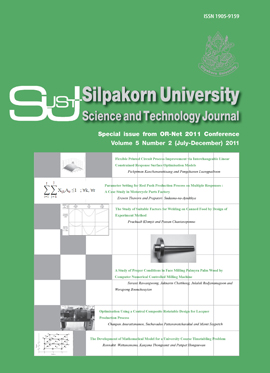The Study of Suitable Factors for Welding on Canned Food by Design of Experiment Method
Main Article Content
Abstract
This research aimed to study the factors that affected canned food welding and the suitable conditionof the design of experiment that affected its quality and suitability which finally led to standard qualityreference in real work place.This research utilized the concept of experiment design and analysis to study 4 factors as follows; theelectric current, a spring pressure, size of copper wire and overlapping area. By testing 3 response valuesof welding which were welding strength, welding flexibility, and welding thickness, we found the suitablefactors and conditions of the experiment. The results indicated that electric current, spring pressure, and sizeof copper wire had stronger influence on welding strength and flexibility, whereas only electric current andspring pressure had influence on welding, welding thickness and welding flexibility. The overlapping areahad less influence comparing to other factors. The study concluded that the suitable conditions for weldingwere 55 Amp of electric current, a spring pressure of 60 daN, wire diameter of 2.10 mm. and overlappingarea of 0.7 mm.
Downloads
Article Details
References
Kieatcharoenphol, T. (1994). To find the optimum conditions for the coating of lacquer on a piece of tin coated steel by means of experimental design. Master’s thesis. Department of Industrial Engineering. Graduate School. Chulalongkorn University.
Mahakapakorn, S. (1996). The study of the integration process of TIG for stainless steel pipes, drums, casings of SUS436L. Master’s thesis. Chulalongkorn University.
Pimsarn, S. (2004). Factors that are suitable for application on polyester powder coating welding cans. Master’s thesis. Department of Industrial Engineering. King Mongkut’s University of Technology North Bangkok.
Pongudom, U. (2010). The factors that fit into the aluminum tube from a roll forming process. Case factory radiator Thesis Master. Department of Industrial Engineering. King Mongkut’s University of Technology North Bangkok.
Myers, R. H, and Montgomery, D. C. (2002). Response Surface Methodology. 2rd ed., New York: John Wiley & Sons.


